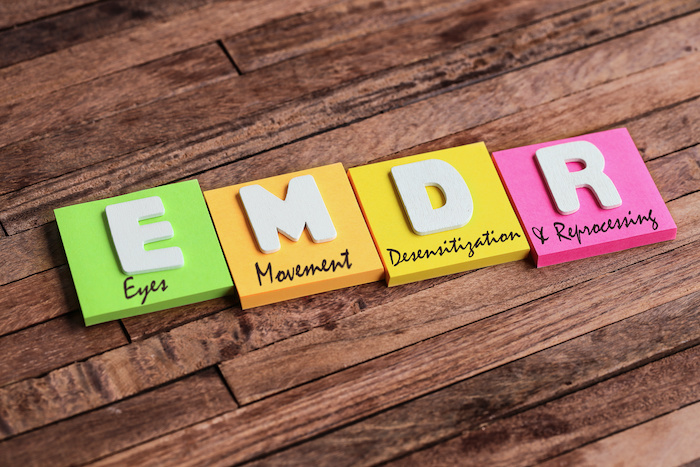EMDR / Trauma Therapy
Traumatic experiences can negatively influence our mental and physical health making daily life difficult, so tasks like learning, working, and even socializing with others become a stressful burden. This can happen for children and adults, often leading people to feel alone, overwhelmed, and sometimes even feeling hopeless.
SYMPTOMS OF TRAUMA

Typical symptoms of Trauma – you may experience one or many of the following:
- Ruminating thoughts of the event that you wish would end
- Anxiety can cause stomach aches or headaches
- Panic attacks that make you feel like your chest is tight and you can’t breathe
- Constant worry
- Worrying about what others think and feel about you
- Nightmares
- Depression – lack of enjoyment of things you used to enjoy
- Sleeping more or less than usual
- Eating more or less than usual
- Feeling down on yourself and not liking yourself
- Suicidal thoughts or just wishing you were dead
- Thinking others would be better off without you
- Avoiding people, places or things that remind you of the event
- In Children it is common to see regressive behavior – thumb sucking, bed wetting, fear of sleeping in their room, fear of things they were not afraid of in the past. Oftentimes a change in personality. Children get irritable when depressed and often isolate.
- Guilt
- Fear
- Having “negative voices” in your thoughts
Traumatic experiences happen to people in all types of various ways.
Many people think of trauma experiences having to be events like childhood abuse, war or military trauma, or physical or sexual assaults experienced in adolescence or adulthood. However trauma can occur from any experience which negatively affects your health, like when negative experiences from the past trigger ongoing chronic migraines, create anxiety and depression symptoms well after the traumatic events have passed by, or these traumatic experiences lead to problems interacting with other people because of fear, irritability, or bouts of anger.

You do not have to be diagnosed with Posttraumatic Stress Disorder (PTSD) to have had traumatic life events negatively influence your health and wellbeing. Trauma therapies, like EMDR, are helpful for PTSD and Complex PTSD in addition to being helpful to treat other trauma associated problems that create mental and physical difficulties (like depression and relationship conflict).
However, there is hope. There are various ways to treat trauma that will alleviate symptoms and help you successfully process your trauma into the past, where it belongs!
It is helpful to research the right trauma therapy for you. Some people prefer more cognitive approaches like Trauma-Focused Cognitive Behavioral Therapy (CBT) or Cognitive Processing Therapy (CPT). Other people find benefit and relief through more creative and experiential trauma treatment approaches, like through Art Therapy or Sand Tray Therapy, and even other traditional talk therapies of various orientations can be helpful for trauma processing.
 Eye Movement Desensitization and Reprocessing (EMDR) Therapy is a thoroughly researched and practiced trauma processing technique that works by directly helping a person’s brain change the way the brain stores and experiences traumatic memories. This technique gets its name from the original way researchers and therapists provided bilateral brain stimulation by having clients watch a light travel right and left, back and forth, across a lightbar while working through an EMDR protocol guided by their therapist. Overall, EMDR helps people reduce or even eliminate disruptive symptoms associated with their traumatic experiences and allows the brain to efficiently and effectively process the traumatic memory so the memory feels more like other less traumatic memories. If you want to learn more about EMDR, check out the American Psychological Association’s (APA) informational page.
Eye Movement Desensitization and Reprocessing (EMDR) Therapy is a thoroughly researched and practiced trauma processing technique that works by directly helping a person’s brain change the way the brain stores and experiences traumatic memories. This technique gets its name from the original way researchers and therapists provided bilateral brain stimulation by having clients watch a light travel right and left, back and forth, across a lightbar while working through an EMDR protocol guided by their therapist. Overall, EMDR helps people reduce or even eliminate disruptive symptoms associated with their traumatic experiences and allows the brain to efficiently and effectively process the traumatic memory so the memory feels more like other less traumatic memories. If you want to learn more about EMDR, check out the American Psychological Association’s (APA) informational page.
At Soul Work Counseling, most of our EMDR trained therapists use hand tappers or auditory bilateral stimulation through sound tones. In the office, you can use your therapist’s handheld TheraTapper© by holding one paddle in each hand, and you will feel a gentle vibrating pulse alternating between your left and right hands while you talk and work through the EMDR protocol with your therapist. If you prefer the auditory method of bilateral brain stimulation, you can use a set of earbuds or headphones that allow you to hear a tone that alternates between your right and left ears while you talk and work through the EMDR protocol. The auditory tone method is also effective during Telehealth sessions in addition to in-person sessions in the office with your therapist. There are free apps available for smart phones that can provide auditory bilateral stimulation. Many of our therapists like and use EMDR Kit©.

Please contact us to schedule with one of our EMDR trained therapists at Soul Work Counseling.
